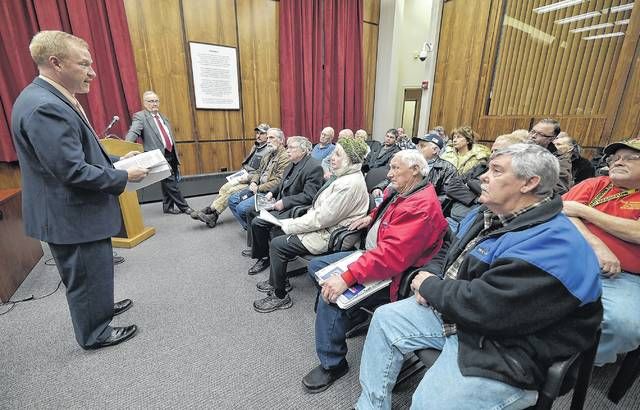
Joe Granteed of Plains Township is seen at the Luzerne County Courthouse on Tuesday where he came to speak out about the regional stormwater fee levvied on sanitary authority customers.
Aimee Dilger|Times Leader
Click here to subscribe today or Login.
About 100 area residents attended Tuesday’s Luzerne County Council meeting to urge the legislative body to pursue legal action attempting to stop a federal pollution reduction mandate and stormwater fees.
Councilman Walter Griffith had proposed the county seek an injunction in federal court to halt the mandate and fee on behalf of residents.
Council did not vote because the county law office is still reviewing the legal issues involved in the mandate to determine if an action is possible — and if so, what resources that would be required to take on such a major case. That comprehensive opinion won’t be ready until the Feb. 11 council meeting.
Under the mandate, sediment, nitrogen and phosphorus in the Susquehanna River and Chesapeake Bay must be reduced over the next five years. Some county municipalities have opted to comply by signing up for regional programs through the Wyoming Valley Sanitary Authority and Dallas Area Municipal Authority funded by stormwater fees.
Mike Stash, one of several representatives designated by the group to passionately implore council to intervene, said the fees are hurting the local economy and residents. The fees will continue to rise and never end because the stormwater parks, rain gardens and other pollution reduction projects must be maintained, he argued.
A Lehman Township landscaper and chairman of the new Taxpayer Power group, Stash questioned the scientific effectiveness of the proposed projects.
Larksville resident Bryan Dwyer said he supported the county’s switch to a customized home rule government structure to increase local control over county matters and said he would pay more in property taxes to get the stormwater matter litigated.
“I think it’s your duty as stewards of this county to take that action,” said Dwyer, noting he has refused to pay the stormwater fee despite the threat of liens.
Griffith said he understands the “challenges” the county law office faces pursuing litigation but believes it is “important” and said he will try to get legislators involved in providing assistance. Griffith said the law office needs more time to review options because filing a federal injunction is “not child’s play.”
Solicitor Vito DeLuca told council the upcoming legal assessment may be presented in closed-door executive session because it involves potential litigation.
Many also spoke against continuation of a $5 vehicle fee during a public hearing preceding the meeting. Council plans to vote Feb. 11 on Councilman Stephen J. Urban’s proposal to stop collecting the fee the end of this year.
Prison contract
Council voted Tuesday to approve a new collective bargaining agreement with about 200 correctional officers and other unionized prison workers. The last contract expired the end of 2018.
Some contract highlights provided by Correctional Services Division Head Mark Rockovich:
• Workers will receive a 3% bonus for 2019 and raises of 2.5% in 2020, 2021 and 2022 and 3% in 2023.
• The annual clothing allowance was increased from $625 to $700, but the money will be deposited in a vendor account for approved items instead of provided as a check to employees.
• Current employees will pay 10% toward health insurance until 2023, when the contribution rises to 12%. Employees hired after the contract is ratified will start at 12% contributions that increase to 15% in 2023.
• Instead of keeping correctional officers segregated at the prison and nearby minimal offenders building in Wilkes-Barre, the administration will be permitted to move workers to meet minimum manning requirements at either building to reduce the need to pay overtime.
• Employees must have at least nine accumulated sick days to qualify for switching shifts with fellow workers.
Prison union representative Tom Borum said this was the first contract that did not go to binding arbitration in at least a decade. He said he believes it is better for both the county and employees if an agreement can be reached through negotiations, as opposed to a decision made by an outside arbitrator.
“I really do think it was a fair deal for both sides,” Borum said of the new agreement.
Urban was the lone vote against the contract, saying he believes it will cost too much and provides “too many days off.” Griffith said he disagrees with some of the aspects of the contract but supported it.
Council also unanimously approved settlement of pending litigation against county Children and Youth involving the death of two of three boys in an October 2017 fire in Laflin.
Chief Solicitor Romilda Crocamo said the county’s insurance will cover the county’s half of the settlement, or $5,000, in addition to all legal costs. Philadelphia will pay the other half of the $10,000 settlement.
Reach Jennifer Learn-Andes at 570-991-6388 or on Twitter @TLJenLearnAndes.






